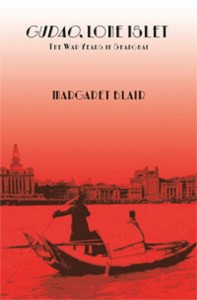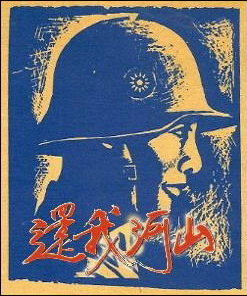Childhood in Shadow of War
- By Guest blogger
- 28 May, 2016
- No Comments
 Margaret Blair was born in Shanghai in 1936 and spent the years from 1942 to 1945 in a Japanese internment camp. In her memoir Gudao, Lone Islet she paints a vivid picture of a childhood in the shadow of war. In the Q&A below she explains what moved her to write this much-praised book, and also introduces her next book, Shanghai Scarlet. Read more on her website www.margaretblair.com.
Margaret Blair was born in Shanghai in 1936 and spent the years from 1942 to 1945 in a Japanese internment camp. In her memoir Gudao, Lone Islet she paints a vivid picture of a childhood in the shadow of war. In the Q&A below she explains what moved her to write this much-praised book, and also introduces her next book, Shanghai Scarlet. Read more on her website www.margaretblair.com.Why did you write this book?
There were several motivations. First, I felt the usual memoir omitted information on what was going on outside the writer’s city or internment camp. Also, as I read more, I was concerned about how little I had known before. I came to the conclusion that my memoir should have a larger scope than the usual story of internment by the Japanese.
Second, I was horrified at the Chinese Holocaust, estimated by professor Chalmers Johnson at 23 million Chinese civilians murdered by the Japanese in the Co-Prosperity Sphere, and concerned that I knew virtually nothing about it until taking up my own writing task. The media concentrated on Hiroshima and Nagasaki. There was little or no information about the other side of the story of the Pacific World War II: what horrors the Chinese had suffered. Also, I found there was a third area of conflict: that between the Communists and Nationalists in China. Throughout the memoir, and in a concise way, I’ve tried to bring out the several sides of the story of what happened during the war.
Third, Accounts of the cosmopolitan, modern, pre-war city of Shanghai fascinated me. I had lived there, but previously knew so little about it, and believed accounts of Treaty Port life, for both foreigners and Chinese, should be included in my memoir as they would be of interest to others.
Fourth, There are few people now alive who remember these events and places. Much has been written up in academic books, both Western and Japanese, which few read as they are not very accessible, partly because they are in academic libraries and partly because they are written in a style that is not readily understood by the ordinary reading public. I would like to make this information more available to the public in general.
Why do you think you were so ill-informed about Pacific World War II?
For good and kind reasons, my parents didn’t discuss, and distracted my brother and me from, the wartime experiences. There was also another factor, affecting information for everyone, and that was the cover-up of what the Japanese did. As soon as in the 1930s the Japanese noticed international disapproval of their actions in the Far East, their governments started a strong and so far unrelenting propaganda campaign of denial. This was backed by the Allies in particular the United States who feared Japan would join the USSR.
However, there is a third factor, and that is, particularly in North America, the media’s not meeting their responsibilities in investigating and reporting on the Chinese Holocaust. I mentioned the inaccessibility of academic studies to the public, but it is not academics that are expected to inform the general public, it is the media. The media are the people who communicate most directly with the general public.
In your Epilogue you deal in more depth, than is usual for a memoir such as yours, with the aftermath of the war to the present day. Wouldn’t it have been preferable, and neater, to end with the dead seagull waving Goodbye, and with your Afterword?
I think not. Not preferable, not neater. As a child I was impressed with how the tragedies of the First World War continued to affect and be remembered by those who survived, in particular for the Scottish branch of my family. In the 1930s and after, the First World War was very much a presence. Wars don’t just stop and then everyone returns to normal. They continue to have an effect.
For the Second World War, I believe this is more accurate of the Pacific war than of the European. In the Pacific, apologies and amends were not made and there was actually a concerted effort by the powers involved, on both sides, to cover up. If you want to see Holocaust Denial, study what happened to the Chinese from 1931 to the present. One example is the petty attacks from Western academics, and threats by the Japanese right wing, against Iris Chang author of The Rape of Nanking. She estimated in Nanking the Japanese troops murdered by hand over twice the number killed by the atomic bombs in Hiroshima and Nagasaki combined. Of course, not that even one death is acceptable.
For the Second World War, I believe this is more accurate of the Pacific war than of the European. In the Pacific, apologies and amends were not made and there was actually a concerted effort by the powers involved, on both sides, to cover up. If you want to see Holocaust Denial, study what happened to the Chinese from 1931 to the present. One example is the petty attacks from Western academics, and threats by the Japanese right wing, against Iris Chang author of The Rape of Nanking. She estimated in Nanking the Japanese troops murdered by hand over twice the number killed by the atomic bombs in Hiroshima and Nagasaki combined. Of course, not that even one death is acceptable.
In writing Gudao, Lone Islet, have you satisfied your own curiosity and interest in the further writing about China?
Indeed No: one area on which I touch in Gudao is the wonderful burgeoning of a modern literary and visual media culture centred largely in Shanghai. In my next book, Shanghai Scarlet, I am exploring this further through the lives of real people. The Japanese occupation and warfare between rival political and criminal factions in China had a tragic effect on their lives. This is a tale of love, intrigue and also murder: both individual murder by political and national factions, and mass murder of the Chinese civilian population by the Japanese.
Given the hard work entailed, have you found the publishing of Gudao, Lone Islet a satisfying experience?
Yes indeed. I have had wonderful feedback from, and re-contacts with, fellow survivors of the Shanghai camps, and their relatives. One, Fred Jones of the UK, told me my book would be his childhood diary too. Another, Roberta Ward of Australia, daughter of a survivor, said “Your book answers so many questions that my family and I have had our whole lives!”. Then there’s the affirmation from an academic in the field, John Meehan SJ professor of History and president of Campion College university of Regina: “Congratulations on the fascinating, wonderful book.”
Lastly, there are the professional reviews. An excerpt from Kirkus: “A well-written, moving perspective on imprisonment, World War II and the history of Shanghai.” An excerpt from the US Review of Books which gave Gudao their RECOMMENDED status: “ … important and riveting … this captivating book is a must for anyone wanting a fresh perspective on World War II.”



 Copyright © 2025
Copyright © 2025
Leave a Reply